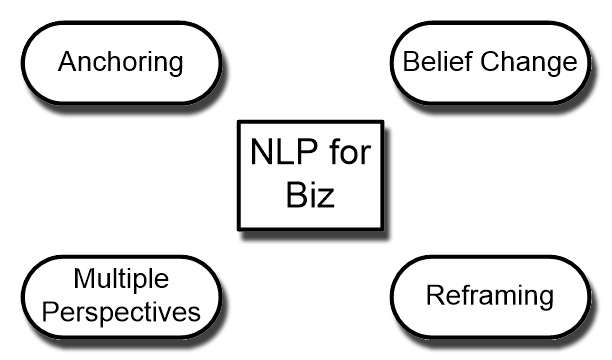|
by Chris McNeil, Pensarc Marketing Do you value excellence in business? One definition of NLP (Neuro Linguistic Programming) is the systemic replication of excellence. As such, it has many applications in a business context. It was developed in the 1970s by linguist John Grinder and programmer Richard Bander. They created a language for decoding the genius of masters of communication like Milton Erickson, the father of hypnotherapy, making their formerly mysterious skills accessible. Bandler, Grinder, and other early leaders of NLP modeled peak performers in sports, business, therapy, science, and other fields. Here, we'll look at a four skills from the NLP toolbox they developed that are useful in business:
Eliciting and Anchoring Positive States Wouldn't it be nice to be able to call upon your highest level of motivation and focus it exactly where you want it? NLP has processes for eliciting any positive state of mind you have experienced and putting it wherever in your life you find helpful. For example, in NLP sales training, measurable improvements in phone sales have been gained by anchoring the expectation of success to answering the phone. Belief Change In Systems Thinking, brought to a wider audience by Peter Senge's book The Fifth Discipline, "mental models" are often levers for making positive change in companies. "Mental Models" is another name for "Belief Systems", or the assumptions we make that underpin our decisions. These are usually unconscious. Being able to uncover, examine, then change a belief system underlying an underperforming business system can be extremely powerful. NLP is rich in systems to discover and change disempowering beliefs. Multiple Perspectives In NLP, we talk about first, second, and third positions as three different ways to perceive a situation. For example, "first position" might be described as seeing things from the eyes of one of your people serving a customer. "Second position", conversely, would be seeing things from the customer's point of view in the same situation (as well as hearing things from the customer's ears). Things can feel quite a bit different from there! Feeling what a customer feels leads to more empathy, a key principle in customer oriented businesses. Third position is observing the situation as an uninvolved third party, without the stronger feelings of first and second position. Different information is gathered from third position, where the interplay can be better observed with detachment. Being able to see things from the customers’ point of view as well as from the detached observer perspective brings new information that helps gain rapport and understanding. Switching positions is a very useful skill for negotiation and resolving conflict. Reframing The ability to put a new frame around a situation can add motivational "juice" and put problems in a new perspective. An example of a powerful reframe that changed an entire industry is when certain restaurateurs realized they were in the entertainment business and not simply in the nourishment business. Personal Fitness Training flourished as more people looked at helping people get fit through the frame of a coach rather than that of a teacher. Nearly any business situation can be reframed to gather new information from seeing it in a different context. NLP has proven to be a powerful tool in sales and business leadership, enabling creating more aligned teams with higher motivation, uncovering the source of and solving business problems, and shedding light on new, innovative perspectives. Reprinted with permission from a longer version at The Mental Game of Business. Chris McNeil has won multiple innovation awards for web applications, is the founder of Pensarc Marketing, an NLP Master Practitioner, and the creator of the e-Merg program that combines digital marketing with customer touch point optimization and team alignment.
0 Comments
Leave a Reply. |
